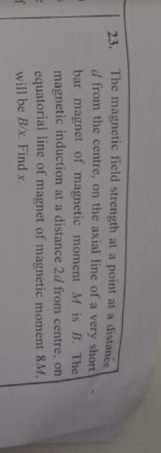Question
Question: The magnetic field strength at a point at a distance $d$ from the centre, on the axial line of a ver...
The magnetic field strength at a point at a distance d from the centre, on the axial line of a very short bar magnet of magnetic moment M is B. The magnetic induction at a distance 2d from centre, on equatorial line of magnet of magnetic moment 8M, will be B/x. Find x.

2
Solution
The problem involves calculating the magnetic field strength due to a short bar magnet at different points and relating them.
1. Magnetic Field on the Axial Line: The magnetic field strength (Baxial) at a point at a distance r from the center on the axial line of a short bar magnet with magnetic moment M is given by: Baxial=4πμ0r32M According to the problem, at a distance d from the center on the axial line, the magnetic field strength is B. So, B=4πμ0d32M(Equation 1)
2. Magnetic Field on the Equatorial Line: The magnetic induction (Bequatorial) at a point at a distance r from the center on the equatorial line of a short bar magnet with magnetic moment M is given by: Bequatorial=4πμ0r3M According to the problem, we need to find the magnetic induction at a distance 2d from the center on the equatorial line of a magnet with magnetic moment 8M. Let this new magnetic induction be B′. Substitute r=2d and M=8M into the equatorial field formula: B′=4πμ0(2d)38M B′=4πμ08d38M B′=4πμ0d3M(Equation 2)
3. Relate B and B' to find x: The problem states that the new magnetic induction B′ is equal to B/x. B′=xB Now, substitute the expressions for B from Equation 1 and B′ from Equation 2: 4πμ0d3M=x1(4πμ0d32M) To solve for x, we can cancel out the common terms (4πμ0d3M) from both sides of the equation: 1=x1×2 1=x2 x=2
The value of x is 2.
